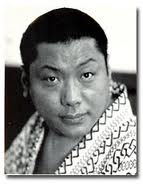.
Ecstatic.
Wrung-out.
Longing for more.
This is how you feel when you shuffle-float your way out of Blue Is the Warmest Color – suffused with a little of that warmth but a little afraid that the world outside is a little colder and a little grayer than the one you’re leaving behind.
It’s one of those rare movies that you find yourself shaking your head over for days afterwards, wondering about, wishing you could somehow get back to. Its protagonists are so well acted and so irresistible that it strikes you as one of life’s great disappointments that you’ll never meet them, never have them over for dinner, never run into them on the street and a grab a spontaneous cup of coffee.
I usually only feel this way about characters in novels, and only the very best of them at that – Eva Sanderson, Sissy Hankshaw, Edna Pontellier, Anna Karenina – but Adèle is that magnetic, and Blue is that grand. Not that epic (at least as AK) but definitely that grand.
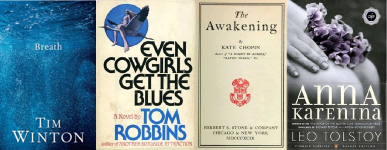
The compensation for not being able to take Adèle home with us (besides the fact that she doesn’t throw herself under a train, thank god) is that we got to see her at all. That, as A.O. Scott puts it, “For a while, her life is [ours].”
À la Tennyson, it’s better to have been with Adèle for a few hours in a movie and lost her than never to have had her at all.
Blue Is the Warmest Color might not change my life in any momentous way, but it’s certainly had an effect the last few days, and I imagine that Adèle and her relationship with Emma and with life will continue to surface from time to time, as with the best of my literary heroines, and make me grateful for the fact that despite terrorists and the Tea Party, we still live in a world where such beautiful characters are made.
Part of the reason you love Adèle so much is because you see so much of her.
I don’t mean that crassly, though there is enough skin in the movie to justify such an assumption. Yet, in addition to her emotional breadth and depth, I do intend a physical, visceral meaning of “so much of her.”

Pic: NYTimes
We see Adèle in almost every shot of the film, and even when she’s not doing anything there’s a potency to her. Whether she’s waiting on a park bench or riding the bus or watching her kindergarten students nap, she communicates a stirring vibrancy. Every one of her pauses is pregnant. The shots of her sleeping, and there are quite a few, are extreme closeups of her feet, her hips, her neck, her lips. She’s positioned athletically, as if caught mid-motion, and she’s breathing heavily, almost snoring, her mouth agape, drool all but dribbling out. Point being, Adèle doesn’t simply rest at night. Sleeping for her is an activity, evidenced in another way by her dreams – vivid as anything else in the picture, and as real to her as she is to us.
And if there’s that much vitality when’s she’s not doing anything, you can imagine how much energy she brings to what she does. She’s an unapologetic gourmand and the gusto with which she eats is often on display, especially early in the film, and leaks over into everything else. She smokes and writes and drinks and laughs and dances and reads and cries with an urgency that transcends the desperation of her teenage years and early twenties, and you find yourself wanting desperately to be a part of it, highs and lows, triumph and heartache alike.
The rough storyline: Adèle, a junior in high school when we first meet her, is trying to navigate the world of her blossoming sexuality and her deeply romantic character. She tries with boys and it doesn’t fit, so she throws her lot in with Emma, a grad student in painting at the Beaux Arts. Laughter and love and sex and soul-bearing and betrayal and tears and snot and pain ensue.
The intensity of Adèle’s engagement with life creates in the half-dozen or so years we’re with her some extraordinary moments of contentedness and connectedness and bliss. It’s also, of course, her undoing. The specifics of this I won’t get into, though by the time you’re halfway in you’re pretty sure what’s going to happen, and you immediately start praying it won’t. I will say, though, that the yes-we’re-really-done-for-good scene was the most heartbreaking I’ve ever seen.
Hell, it was more heartbreaking than all but one of my own real-life yes-we’re-really-done-for-good scenes (which, luckily, really wasn’t).
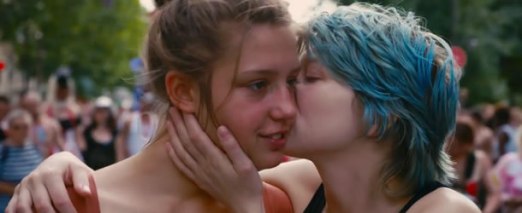
Pic: Reverse Shot
Since superlatives seem to be the rule in Blue, the scene in which Adèle’s school friends try to shame and taunt her into outing herself at a public bus stop after they witness one casual encounter between Adèle and Emma is the best approximation I’ve seen of the rage, shame, frustration and fear such a situation must entail. I’m not gay and nothing like that has ever happened to me, so maybe I’m off the mark, but it was devastating.
Which is probably the phrase I’d make the sub-subtitle of the movie, if it were up to me: Devastation guaranteed.
There are a ton of other things to talk about in the movie: the class implications, the representation of art and artists, the sexual politics (is it self-conscious or is it prurient male fantasy?), whether it can transcend its NC-17 rating (it deserves to), that bullying/outing scene, and most interestingly, original author Julie Maroh’s reaction to the whole thing.
I’m not that worked up about the sex itself – the scenes were long, they were intense, they could break through anyone’s hungover Puritan prudeness or world-weary coolness (well, anyone but NYC film critics, of course) – but it was only part of the whole emotional banquet that director Abdellatif Kechiche lays out for us. And that – the experience of being briefly but wholly integrated into a fully conceived world – was the most interesting part of the movie for me. Adèle Exarchopoulos, who played Adèle, said in an interview, “We [Léa Seydoux, who played Emma] had to show how making love to someone is visceral. We had to convey how much of yourself you give over,” and they did that, in the meta- sense of imbuing the fictional story with their own real-life courage and trust in one another, as actresses.
What’s more, whose sexual politics are pure and correct and unburdened by the myriad issues and hangups of modern society and our own irrational desires and fantasies? We don’t write off Anna Karenina, or Anna Karenina, because Anna and Tolstoy had questionable morals and worldviews. Instead, we love Anna because she dared to love and live her life in ways that most of us aren’t capable of, precisely because she didn’t care about the strictures that society and/or anyone else tried to put on her passions.
Devastation is commensurate with the bliss it succeeds.
We all know this to some degree or other, and we live our lives accordingly. The vast majority of us hedge our bets, sacrificing what we assume or suspect or even downright know will be blissful for fear of the devastation that may come of it. Anna Karenina wasn’t willing to bridle her passions or curb her excesses, which actions amount to the willingness to risk their cost ahead of time, without knowing or caring what those costs may be.
We love Adèle because she dares to do the same.
And I aspire to demonstrate half her courage.
Anyway, look at the preview, and then tell me you don’t want to see it.
If you have seen it, what’d you think?
If not, go! and then come back and tell me.


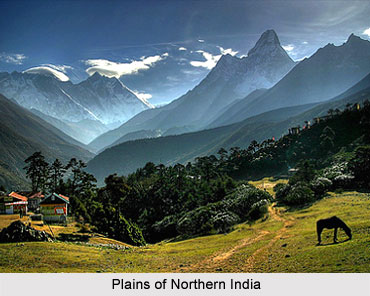


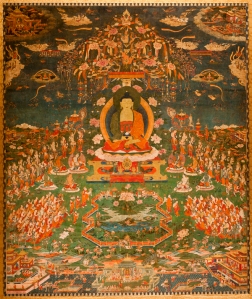
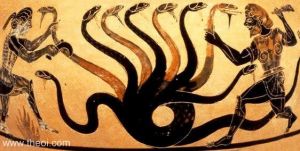

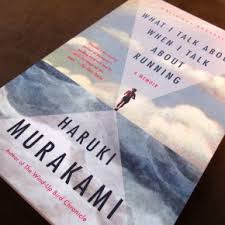 (Though at the same time I don’t mean to overstate how “hard” it is – even ultra-marathon-running
(Though at the same time I don’t mean to overstate how “hard” it is – even ultra-marathon-running 
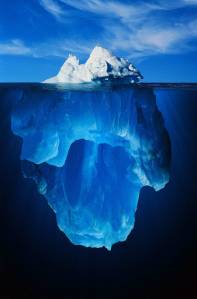 Don’t get me wrong – they’re not simpletons or noble savages. They have their shit to deal with, and their interests are wide and their understandings of the world deep and some of them are dedicated to a lot of things outside of work, but to a certain degree, they’re parking in the shade. It’s a pretty cush gig – at least, not a whole lotta what you call whip-cracking. Plenty of people would love to have this job, and most everyone here is to proud to, and most of them are grateful for it, “especially in this economy” and all that. So it seems kind of reductionist of me to say, “Meh, it’s just my day job, whatever, it’s not even a big deal.” That’s where my self-confidence and goals (daydreams) and discontent tip into arrogance. And I find myself there quite often.
Don’t get me wrong – they’re not simpletons or noble savages. They have their shit to deal with, and their interests are wide and their understandings of the world deep and some of them are dedicated to a lot of things outside of work, but to a certain degree, they’re parking in the shade. It’s a pretty cush gig – at least, not a whole lotta what you call whip-cracking. Plenty of people would love to have this job, and most everyone here is to proud to, and most of them are grateful for it, “especially in this economy” and all that. So it seems kind of reductionist of me to say, “Meh, it’s just my day job, whatever, it’s not even a big deal.” That’s where my self-confidence and goals (daydreams) and discontent tip into arrogance. And I find myself there quite often.
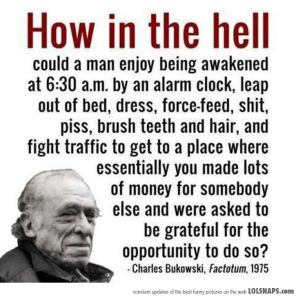
 I have to imagine this results in part from a very American sense of entitlement. We’re taught that self-employment is the key to happiness, or at least that it’s the full embodiment of the American ideal, and that it’ll bring us riches and a sense of self-sufficiency unrivaled by the drudgery and servitude of working for someone else. One of the more nefariously defeating Myths of America is that everyone can and should make his own way to greatness in the world, when really that’s just simply not possible, for a panoply of reasons we all know by now (right? Right).
I have to imagine this results in part from a very American sense of entitlement. We’re taught that self-employment is the key to happiness, or at least that it’s the full embodiment of the American ideal, and that it’ll bring us riches and a sense of self-sufficiency unrivaled by the drudgery and servitude of working for someone else. One of the more nefariously defeating Myths of America is that everyone can and should make his own way to greatness in the world, when really that’s just simply not possible, for a panoply of reasons we all know by now (right? Right).






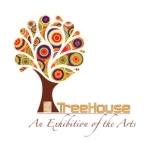
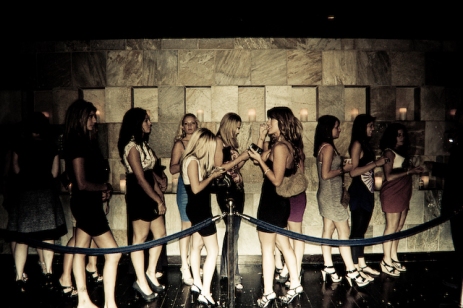
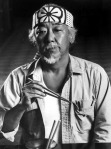 This is hardly unique – even to writers, let alone to just me. I think we all make assumptions all day long about where people come from and how we’d act in situations we come across. An image presents itself, and a backstory unfurls behind it. Most of us just immediately let them go. Most of the time, I do. But every once in a while, I pluck an image-packet out of the ether as it whizzes by, like Mr. Miyagi with his chopsticks, and write it down.
This is hardly unique – even to writers, let alone to just me. I think we all make assumptions all day long about where people come from and how we’d act in situations we come across. An image presents itself, and a backstory unfurls behind it. Most of us just immediately let them go. Most of the time, I do. But every once in a while, I pluck an image-packet out of the ether as it whizzes by, like Mr. Miyagi with his chopsticks, and write it down. By way of example: I heard a story on NPR last fall about a handful of people who were going to jail for a very long time for defrauding the State of California by redeeming recycling deposits on cans and bottles they collected out of state. It was irresistible, but I had to carry it around for eight months before I could figure out how to use it. Because a story about the fraud ring would be journalism, and that’d already been done. (Besides, I couldn’t be bothered with all those…facts.)
By way of example: I heard a story on NPR last fall about a handful of people who were going to jail for a very long time for defrauding the State of California by redeeming recycling deposits on cans and bottles they collected out of state. It was irresistible, but I had to carry it around for eight months before I could figure out how to use it. Because a story about the fraud ring would be journalism, and that’d already been done. (Besides, I couldn’t be bothered with all those…facts.)
 That Papaism applies to life, too, for – at the risk of sounding trite – life itself is a process of constant revision. I certainly didn’t come out polished and blemish-free, as those who’ve had to put up with me know only too well, and all these conceptions and notions I have about myself constantly prove to be only flimsy veneers over…something else. If I try to manage my personality or “craft my image,” I come across as inauthentic, feel horrible about it, and act accordingly (that is, hostile). And then that interpersonal magic that we live for – that real-life ineffable something – becomes an impossibility.
That Papaism applies to life, too, for – at the risk of sounding trite – life itself is a process of constant revision. I certainly didn’t come out polished and blemish-free, as those who’ve had to put up with me know only too well, and all these conceptions and notions I have about myself constantly prove to be only flimsy veneers over…something else. If I try to manage my personality or “craft my image,” I come across as inauthentic, feel horrible about it, and act accordingly (that is, hostile). And then that interpersonal magic that we live for – that real-life ineffable something – becomes an impossibility. Since we’re getting close to the end, let me try to sum up: creativity is about paring away the layers upon layers of superficial nonsense we pile on over the years, discovering what you-and-you-alone harbor in the hidden recesses where your undiluted magic resides, and making do with what is found there.
Since we’re getting close to the end, let me try to sum up: creativity is about paring away the layers upon layers of superficial nonsense we pile on over the years, discovering what you-and-you-alone harbor in the hidden recesses where your undiluted magic resides, and making do with what is found there.

 But the stuff about the snail isn’t (for me) the most interesting part of In Search of Memory. It was Kandel’s search for one of his own memories – his dedication to that search, and the weight that memory has – that was so compelling.
But the stuff about the snail isn’t (for me) the most interesting part of In Search of Memory. It was Kandel’s search for one of his own memories – his dedication to that search, and the weight that memory has – that was so compelling.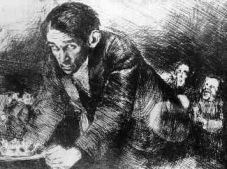
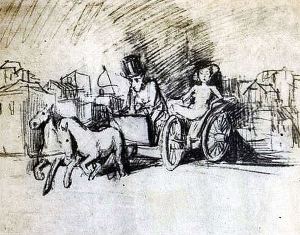
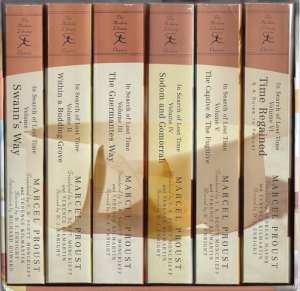
 One thing any seven year old knows is that one thing these things are really good for is throwing into the dirt.
One thing any seven year old knows is that one thing these things are really good for is throwing into the dirt.



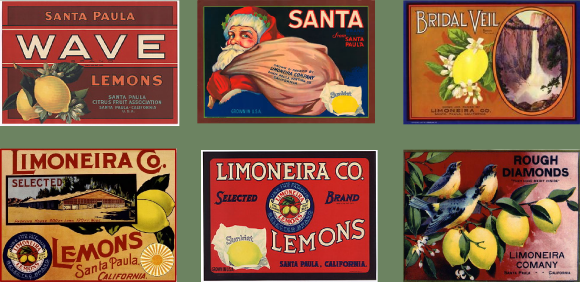











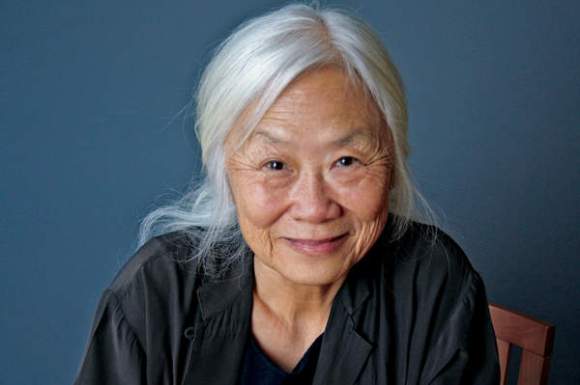
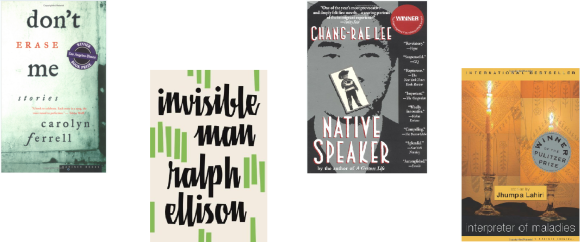
 We all are, really, in our own ways. I don’t talk about it too much because it can sound (and get) a little batty, but at core I totally buy into the risks Wallace outlined in Infinite Jest, and those Huxley did in Brave New World, and Burgess in The Wanting Seed, and dozens of others in their own way.
We all are, really, in our own ways. I don’t talk about it too much because it can sound (and get) a little batty, but at core I totally buy into the risks Wallace outlined in Infinite Jest, and those Huxley did in Brave New World, and Burgess in The Wanting Seed, and dozens of others in their own way.